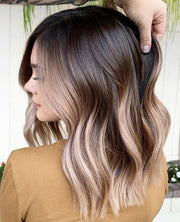
The truth about sulfates in your shampoo and conditioner
Okay so you might have heard of this thing called Sodium Lauryl Sulfate (SLS) - it’s in a lot of skincare products like body wash, cleansers and of course, shampoo & conditioners. And it’s been getting a lot of bad press lately.
SLS - or its variant Sodium Laureth Sulfate (SLES) - are also commonly found household cleaners, albeit in different concentrations, but that’s probably why it gets a bad rap and commonly misunderstood. It’s actually the ingredient in our skincare and haircare products creates that rich lather - one that a lot of people associate with a deep clean.
So what is it exactly? Is it as bad as everyone says it is? Should you throw out that supermarket shampoo? We’re here to answer some questions so you don’t stress about SLS.
It’s a surfactant.
A sur-what? This means that it lowers the surface tension between ingredients, making it a great cleansing and foaming agent. SLS traps oil-based dirt which then washes away with water - that’s why it’s so common in cleansers, shampoos... and household cleaning products.
It’s not life threatening
It’s not a carcinogen - studies have shown zero links between the use of SLS and increased cancer risks.
But it’s also not great for you (and your hair)
All the above being said, it is still a known irritant. We’re sure our sensitive scalped sisters are already using SLS free shampoos and conditioners but one more time for the ladies (and gents in the back), SLS can dry your hair, strip it of your hard earned colour as well as irritate your scalp.
It’s a particular concern for those who have dry or processed hair and those who suffer from skin conditions like eczema, dermatitis and psoriasis.
Using a SLS and paraben-free alternative like Davroe Moisture Senses Hydrating Shampoo (and it’s Hydrating Conditioner counterpart) will inject some much needed hydration back into your hair.
Removing SLS will help with frizzy hair!
Hands up if you suffer from frizz… It seriously feels like an eternal fight against frizz sometimes. Good news though, saying see you later to SLS will mean less frizzy hair because there’s no cleaning agent stripping its natural oils. R+Co Atlantis Moisturising Shampoo is SLS and SLES free, and contains Japanese witch hazel which balances out hydration levels and prevents frizz. If you still need to do some damage control on your frizz, don't worry - it happens to the best of us. An Olaplex hair treatment is exactly what you need.
While our minds goes straight to the oceans, chemicals like SLS can actually decompose into simple, non-toxic components in 96 hours or less - so by the time they reach out water ways, they’re mostly degraded. It actually has to do with the fact that palm oil is used in the production of most SLS, and producing palm oil is incredibly devastating the environment and in its destructive path has also displaced Indigenous people, destroyed wildlife and disrupted delicate ecosystems.
So while SLS is safe in small doses, it’s probably better to stick to some SLS-free alternatives if you’re unsure, have skin concerns, want to be sure of your supply chain or like us, you want to fight the frizz.
There are so many great alternatives like Redken, Tigi, Davroe and Nak and even our favourite Olaplex - did you know they now do Shampoo & Conditioner? - that all leave SLS out of their ingredient list.
Shop a great range of Shampoo and Conditioner on Oz Hair & Beauty today.
Did you love this post? There's much more where that came from! Read all about our newest products (including a refreshing electric essential oil diffuser) and discover our ultimate self care plan all on the Oz Hair and Beauty blog today!
categories









